Harlech
Harlech (Welsh pronunciation: [ˈharlɛχ]) is a seaside resort and community in Gwynedd, north Wales and formerly in the historic county of Merionethshire. It lies on Tremadog Bay in the Snowdonia National Park. Before 1966, it belonged to the Meirionydd District of the 1974 County of Gwynedd. Its landmark Harlech Castle was begun in 1283 by Edward I of England, captured by Owain Glyndŵr, and in the 1480s, a stronghold of Henry Tudor.[2] Once on a seaside cliff face, it is now half a mile (800 m) inland.[3] New housing has appeared in the low town and in the high town around the shopping street, church and castle. The two are linked by a steep road called "Twtil".[4] Of its 1,447 inhabitants, 51 per cent habitually speak Welsh.[5] The built-up area with Llanfair had a population of 1,762 in the 2001 census, over half of whom lacked Welsh identity,[6] and the electoral ward which includes Talsarnau 1,997 in the 2011 census. The estimate in 2019 was 1,881.[7]
| Harlech | |
|---|---|
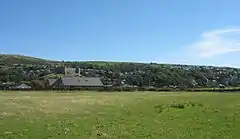 Harlech from the beach area; the castle is seen centre-left | |
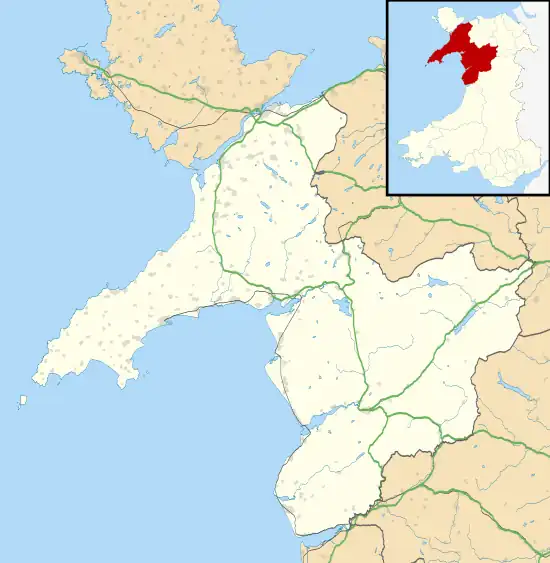 Harlech Location within Gwynedd | |
| Population | 1,263 (2021 Census) |
| OS grid reference | SH581312 |
| Community |
|
| Principal area | |
| Preserved county | |
| Country | Wales |
| Sovereign state | United Kingdom |
| Post town | HARLECH |
| Postcode district | LL46 |
| Dialling code | 01766 |
| Police | North Wales |
| Fire | North Wales |
| Ambulance | Welsh |
| UK Parliament | |
| Senedd Cymru – Welsh Parliament | |

Etymology
The exact derivation of the name "Harlech" is unclear. Some, mostly older sources derive it from Arddlech, i. e. ardd (high) + llech (rock),[8][9] referring to the prominent crag on which the castle stands. Recent sources prefer a simpler derivation from the two Welsh words hardd (fair/fine) and llech (slate/rock).[10]
As late as the 19th century some texts referred to "Harddlech" and "Harddlech Castle".[11][12] This name appears in the mid-19th century translation of the Mabinogion: "And one afternoon he was at Harddlech in Ardudwy, at a court of his. And they were seated upon the rock of Harddlech overlooking the sea." Contemporary documents from the time of the Mabinogion do not mention Harlech, referring only to Llywelyn building his castle "at Ardudwy".[13]
Governance
An electoral ward in the same name includes Talsarnau community. The ward population at the 2011 census was 1,997.[14]
Transport
Harlech railway station is a stop on the Cambrian Coast Line. Services run between Pwllheli and Machynlleth, operated by Transport for Wales.[15]
Local bus services are operated by Lloyds Coaches, with services to Porthmadog and Barmouth.[16]
The town contains Ffordd Pen Llech, a street down the rock spur to the north of the castle. It is the steepest signed, public paved road in the United Kingdom[17][18] and one of the steepest in the world.[nb 1].[19][20][21]
Educational facilities
Ysgol Ardudwy is the county secondary school for children aged 11–16. Ysgol Tanycastell is the town's primary school for children aged 3–11. The town was until 2017 the home of Wales's only long-term adult residential college, Coleg Harlech, also known as the "college of second chance". The premises remain in use as part of Adult Learning Wales – Addysg Oedolion Cymru.
Demographics
The 2011 census recorded 1,762 usual residents. The village is fairly Anglicised, with 48% of residents having been born in Wales and 46.9% born in England. Correspondingly, only 42.6% reported having a Welsh national identity.[22]
Recreation
Theatr Harlech (formerly Theatr Ardudwy) is located on the Coleg Harlech campus and stages a varied selection of plays, music and films throughout the year.
Other attractions in Harlech include its beach backed with sand dunes and the Royal Saint David's Golf Club, which hosted its fifth British Ladies Amateur in 2009. The Rhinogydd (or Rhinogs) range of mountains rises to the east.
In 2007, a Lockheed P-38 Lightning (a World War II-era fighter aircraft) was rediscovered on Harlech beach. It has been described as "one of the most important WWII finds in recent history". The International Group for Historic Aircraft Recovery (TIGHAR) expressed an interest in salvaging the wreck of the U.S. Army Air Forces plane, known as the Maid of Harlech.[23] However, in August 2019, Cadw, the Welsh government's historic environment service, gave the remains scheduled status, making it the first legally designated military aircraft crash site in the UK to be protected for its historic and archaeological interest.[24] The site is also controlled under the Protection of Military Remains Act 1986. The aircraft came down in September 1942 when it was on a gunnery practice mission. The pilot was Second Lt Robert F Elliott, 24, of Rich Square, North Carolina, who survived the crash, only to be reported missing in action a few months later.[25]
Harlech has a Scout hut, which acts as a base for outdoor recreational activities.[26]
In traditional and popular culture
- A street in Harlech, Ffordd Pen Llech, was recognised in 2019 by the Guinness World Records as the steepest residential street in the world with a gradient of 1:2.67 (37.45%); however, Baldwin Street in Dunedin, New Zealand, was then recognised with a gradient of 1:2.86 (35%).[27] The steepness was determined by measuring consistently on the lower side of the street – the left or right, whichever was lower. It was later decided that measuring consistently in the middle of the street would be more accurate. This gave Baldwin Street a gradient of 34.8% and Ffordd Pen Llech one of 28.6%, so the title returned to Baldwin Street.[28]
- In the second branch of the Mabinogi ("Branwen, Daughter of Llŷr"), Harlech is the seat of Bendigeidfran, Branwen's brother and king of the Isle of the Mighty.[29]
- The song Men of Harlech is traditionally said to describe events during the seven-year siege of the castle in 1461–1468.[30]
- ITV Wales & West was formerly known as HTV/Harlech Television after its founder Lord Harlech.
Notable residents
In birth order:[31]
- Owain Glyndŵr (c. 1359 – c. 1415), Welsh Rebellion leader, was the last Welshman to claim the title Prince of Wales.
- Ellis Wynne (1671 in Lasynys Fawr – 1734), Welsh-language author and clergyman
- Alfred Perceval Graves (1846–1931), poet, bard and songwriter. He and a large family, including his son the poet Robert Graves, spent summers at Erinfa, a large house north-east of Harlech.[32]
- George Davison (1854–1930), photographer
- Margaret More (1903–1966), composer, was born here.
- Elinor Lyon (1921–2008), children's writer, retired here in 1975 with her schoolteacher husband.[33]
- David Gwilym Morris Roberts (1925–2020), civil engineer, was born here.
- Mari Strachan (born 1945), novelist and librarian, attended secondary school here.
- Philip Pullman (born 1946), children's novelist, attended secondary school here.
Gallery
 Harlech Castle with flags at half mast after the death of Queen Elizabeth the Queen Mother in 2002
Harlech Castle with flags at half mast after the death of Queen Elizabeth the Queen Mother in 2002 Harlech Castle gatehouse
Harlech Castle gatehouse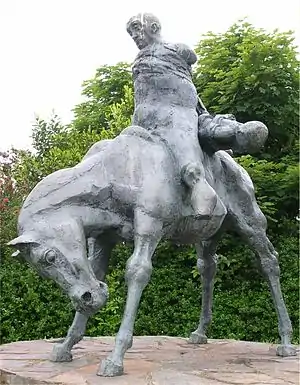 The Two Kings (sculptor Ivor Robert-Jones, 1984) near Harlech Castle, Wales. Bendigeidfran carries the body of his nephew Gwern.
The Two Kings (sculptor Ivor Robert-Jones, 1984) near Harlech Castle, Wales. Bendigeidfran carries the body of his nephew Gwern.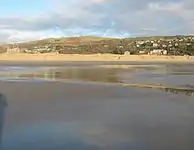 Harlech Beach at low tide
Harlech Beach at low tide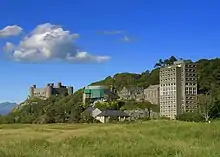 Harlech College with Harlech Castle in background
Harlech College with Harlech Castle in background
See also
- Morfa Harlech sand dunes
- Harlech Castle
- St David's Hotel
- Lord Harlech
- HTV – Harlech Television
References
- "Harlech Community Council". Retrieved 15 November 2020.
- Memoirs of Owen Glendower, (Owain Glyndwr): with a sketch of the history of the ancient Britons, from the conquest of Wales by Edward the First, to the present time, illustrated with various notes, genealogical & topographical at Google Books
- Planet geography , p. 207, at Google Books
- Probably from the English "Toothill" ("look-out hill").
- "Town population and Welsh speakers". Archived from the original on 4 March 2016. Retrieved 16 May 2015.
- UK Census (2011). "Local Area Report – Harlech Built-up area (W37000162)". Nomis. Office for National Statistics. Retrieved 12 December 2019.
- City Population site. Retrieved 3 December 2020.
- "Notices Illustrative of Cambrian History and Antiquities", The New Monthly Magazine, Volume 10 – p. 307, 1818.
- The Celtic Review: Volumes 9–10, Donald MacKinnon, E. C. Carmichael Watson, 1975.
- Anthony David Mills: Oxford Dictionary of British Place Names (Oxford: OUP, 1991).
- The History of the Princes, the Lords Marcher, and the Ancient Nobility of Powys Fadog, and the Ancient Lords of Arwystli, Cedewen, and Meirionydd :Volume 6, Jacob Youde William Lloyd, 1887.
- The Poetical Works of Lewis Glyn Cothi: A celebrated bard, p. 21, Lewis Glyn Cothi, 1837.
- Thomas Jones: Brut y Tywysogion/Chronicle of the Princes, Red Book of Hergest (Cardiff: University of Wales Press, 1955).
- "Ward population 2011". Retrieved 16 May 2015.
- "Timetables". Transport for Wales. May 2023. Retrieved 10 October 2023.
- "Harlech Bus Services". Bus Times. 2023. Retrieved 10 October 2023.
- Rob Ainsley (June 2008). "50 Quirky Bike Rides > 28 Ffordd Pen Llech". Eye Books. Retrieved 15 October 2013.
- "Around the network – Facts and figures". Roads UK. Archived from the original on 19 October 2013. Retrieved 16 October 2013.
- "Dunedin's Baldwin St loses battle for steepest street to Welsh town". Radio New Zealand. Radio New Zealand. 16 July 2019. Retrieved 16 July 2019.
- "Harlech street takes record as steepest in the world". BBC News. 16 July 2019.
- "Welsh town claims record title for world's steepest street". Guinness World Records. 16 July 2019. Retrieved 16 July 2019.
- "Custom report - Nomis - Official Census and Labour Market Statistics". www.nomisweb.co.uk. Retrieved 4 November 2022.
- Charity hopes to lift World War II fighter plane from sea WalesOnline, 8 May 2010
- Harlech P-38 now a Scheduled Monument Cadw, 11 Nov 2019.
- Morris, Steven (12 November 2019). "WW2 wreck of fighter plane off Welsh coast gets protected status". The Guardian. ISSN 0261-3077. Retrieved 12 November 2019.
- Scouts Website
- "Welsh town claims record title for world's steepest street". Guinness World Records. 16 July 2019. Retrieved 16 July 2019.
- "Welsh street loses world's steepest title after New Zealand rival's appeal". theguardian.com. 8 April 2020. Retrieved 8 April 2020.
- Patrick K. Ford, The Mabinogi and other Medieval Welsh Tales (Berkeley: University of California Press, 1977), pp. 57–72.
- The Oxford Companion to British History (Oxford: OUP, 1997) p. 454; Matthew Bennett: Dictionary of Ancient & Medieval Warfare (2001).
- This is a list of people with a Wikipedia page who were born, bred, long resident and/or died in Harlech.
- R. P. Graves: Robert Graves: The assault heroic, Biography 1895–1926, p. 67.
- Introduction by Elinor Lyon, The House in Hiding, Fidra Books, Edinburgh, 2006, p. v.
Notes
- More details can be seen in the 'In traditional and popular culture' section below
External links
- Harlech Tourism Association
- geograph.co.uk – photos of Harlech and surrounding area
